Daily Vocabulary Words: List of Daily Used Words
Hi there. Welcome to this special section @ Wordpandit.
Our endeavour here is straightforward: highlighting important daily vocabulary words, you would encounter in The Hindu. This is your repository of commonly used words; essentially, we are posting a list of daily used words. Hence, this has significant practical application as it teaches you words that are commonly used in a leading publication such as The Hindu.
Visit the website daily to learn words from The Hindu.
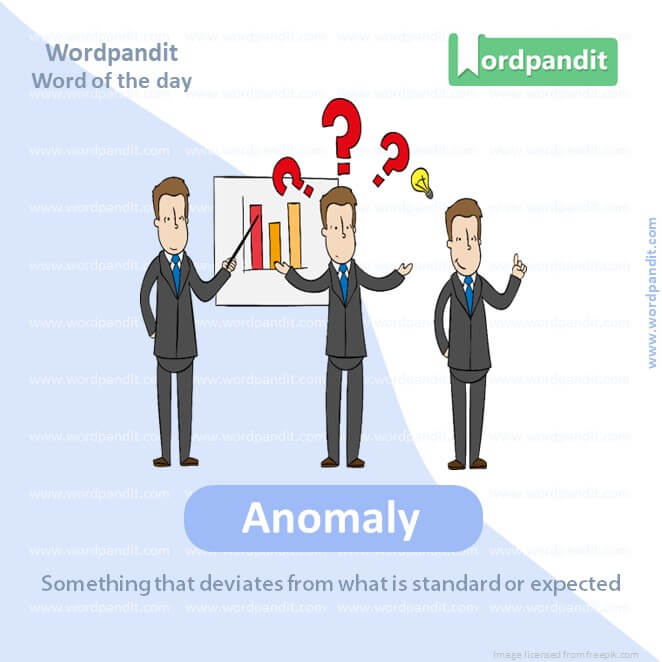
WORD-1: Anomaly
CONTEXT: The Court has corrected this anomaly in the law related to parliamentary privileges by holding that there can be no immunity for a Member of Parliament or a State legislature against a bribery charge in connection with a vote or speech in the legislature.
SOURCE: The Hindu
Explanatory Paragraph: Imagine you see a group of ducks swimming in a pond, but among them, there’s one pink duck. That pink duck is very different from the rest, and it’s not something you see every day. That pink duck is like an anomaly; it’s something unusual or different from what is normal.
Meaning: Something that deviates from what is standard or expected.
Pronunciation: uh-NOM-uh-lee
Synonyms: Aberration, Irregularity, Exception, Oddity, Rarity
Usage Examples:
1.The scientist noticed an anomaly in the data, which didn’t match the expected results.
2.Discovering an anomaly in the weather patterns led to a new research study.
3.The teacher found an anomaly in the student’s homework, a perfect score amidst generally lower grades.
4.In the art exhibition, one abstract painting was an anomaly among traditional portraits.
WORD-2: Foregrounded
CONTEXT: In overruling the majority verdict in P.V. Narasimha Rao vs State (CBI/SPE) (1998), a seven-member Constitution Bench has foregrounded probity as the main aspect of parliamentary functioning.
SOURCE: The Hindu
Explanatory Paragraph: Imagine you’re taking a picture of your friend at the park. You make sure your friend is right in front of the camera, so they are the most important part of the picture. Everything else, like the trees and the swings, are behind them. When your friend is the main focus of the picture, they are foregrounded.
Meaning: Made the most prominent, important, or noticeable feature (verb).
Pronunciation: FOR-ground-ed
Synonyms: Highlighted, Emphasized, Accentuated, Featured, Underlined
Usage Examples:
1.In the debate, the speaker foregrounded the issue of climate change.
2.The documentary foregrounded the experiences of immigrants.
3.The artist foregrounded the colorful flower in the otherwise dark painting.
4.The report foregrounded the need for urgent action on pollution.
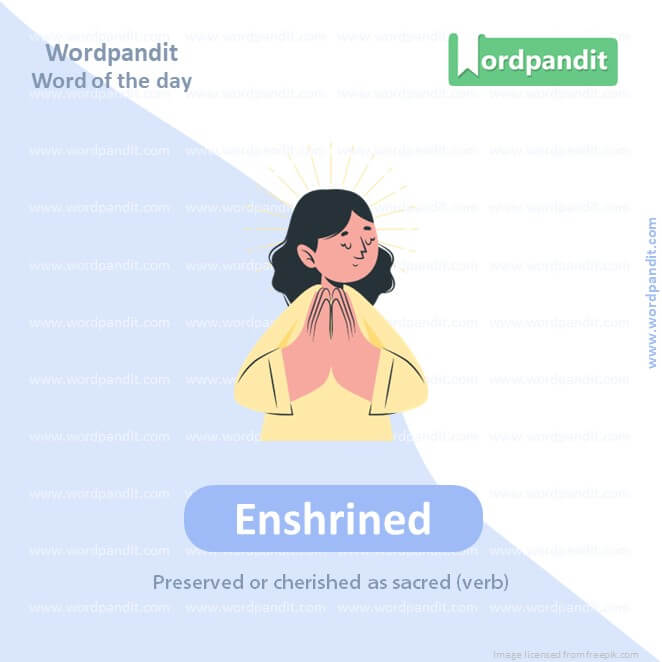
WORD-3: Enshrined
CONTEXT: The Court has made it clear that parliamentary privilege, enshrined in Article 105 (for MPs) and Article 194 (for State legislators) is aimed at protecting the freedom of speech and independence of the legislators in their functioning in the House and cannot extend to bribery
SOURCE: The Hindu
Explanatory Paragraph: Think of your favorite toy or something very special to you that you want to keep safe and remember forever. You might put it in a special box or a place where it can be seen and not get lost. Enshrining something is like that; it’s putting something important in a special place so it can be respected and protected.
Meaning: Preserved or cherished as sacred (verb).
Pronunciation: en-SHRINED
Synonyms: Protected, Safeguarded, Consecrated, Immortalized, Honored
Usage Examples:
1.The constitution enshrines the rights of citizens.
2.Traditions are enshrined through ceremonies and rituals.
3.The museum enshrined artifacts from ancient civilizations.
4.Memories of the day were enshrined in a photo album.
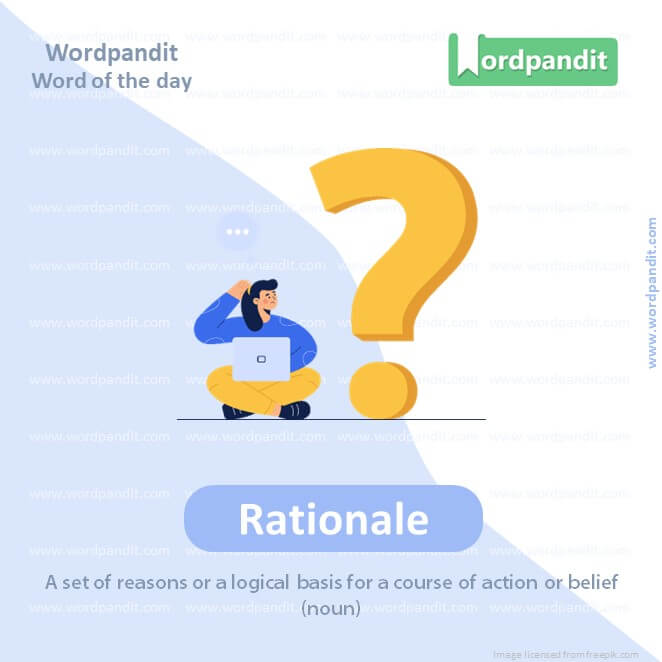
WORD-4: Rationale
CONTEXT: A key rationale that weighed with the Constitution Bench in 1998 was that parliamentary privilege was essential to protecting members from persecution for anything said or any vote in the House.
SOURCE: The Hindu
Explanatory Paragraph: Imagine you want a cookie before dinner, but your parent asks why you want it. You explain that you’re really hungry and will eat your vegetables too. Your explanation or reason for wanting the cookie is like a rationale. It’s the “because” that helps others understand why you want to do something.
Meaning: A set of reasons or a logical basis for a course of action or belief (noun).
Pronunciation: rash-uh-NAL
Synonyms: Reasoning, Explanation, Justification, Basis, Grounds
Usage Examples:
1.The teacher asked for the rationale behind the student’s project choice.
2.The company provided a rationale for the changes in its business strategy.
3.Her rationale for moving to a new city was for a better job opportunity.
4.The scientist presented a rationale for conducting further research.
WORD-5: Weighed
CONTEXT: A key rationale that weighed with the Constitution Bench in 1998 was that parliamentary privilege was essential to protecting members from persecution for anything said or any vote in the House.
SOURCE: The Hindu
Explanatory Paragraph: Imagine you’re holding a balloon in one hand and a heavy book in the other. You can feel the book is heavy and the balloon is light. When you weigh something, you’re finding out how heavy or light it is, just like noticing the difference between the balloon and the book.
Meaning: Considered something carefully before making a decision (verb). Also, measured how heavy something is (verb).
Pronunciation: WAYD
Synonyms: Considered, Evaluated, Assessed, Balanced, Contemplated
Usage Examples:
1.She weighed the pros and cons before making a choice.
2.The package was weighed at the post office.
3.He weighed his options before accepting the job offer.
4.The decision was weighed carefully by the committee.
WORD-6: Bribery
CONTEXT: the seven-member Bench has concluded that the potential for such misuse is neither enhanced nor diminished by recognising the court’s jurisdiction to prosecute a member for bribery.
SOURCE: The Hindu
Explanatory Paragraph: Imagine someone wants to be the first in line for lunch, so they give the teacher a gift to let them go first. That’s not fair, right? Bribery is when someone gives something like money or gifts to get something they want, which isn’t allowed or fair.
Meaning: The act of giving or receiving something of value to influence the actions of an official or other person in charge (noun).
Pronunciation: BRY-buh-ree
Synonyms: Corruption, Payoff, Kickback, Inducement, Graft
Usage Examples:
1.The politician was accused of bribery for accepting gifts in exchange for favors.
2.Bribery is illegal and can lead to jail time.
3.The company was investigated for bribery in securing contracts.
4.To fight corruption, laws against bribery must be enforced.
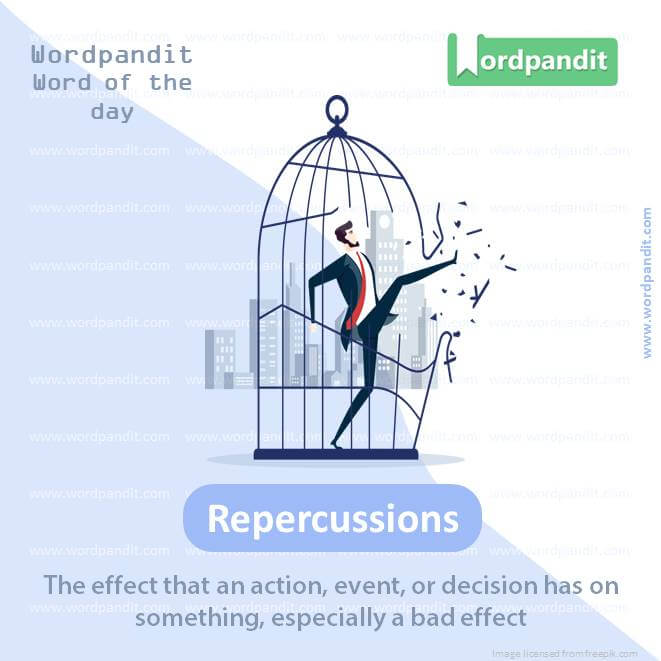
WORD-7: Repercussions
CONTEXT: When civilian groups resort to violence against state actors without repercussions, one has to call into question the maintenance of law and order in the State of Manipur.
SOURCE: The Hindu
Explanatory Paragraph: Imagine you throw a ball inside the house, and it breaks a window. Your parents might be upset, and you might have to help fix it. Those are repercussions, which means things that happen because of what you did, like getting in trouble or having to say sorry.
Meaning: The effect that an action, event, or decision has on something, especially a bad effect
Pronunciation: ree-per-KUH-shuns
Synonyms: Consequences, Aftereffects, Outcomes, Fallout, Ramifications
Usage Examples:
1.The decision had serious repercussions for the company’s future.
2.Ignoring environmental laws can have dire repercussions for the planet.
3.The repercussions of the mistake were felt by the whole team.
4.She faced the repercussions of arriving late to the meeting.
WORD-8: Ethnicised
CONTEXT: The police in the valley are heavily ethnicised with barely any representation from the Kuki-Zo minority.
SOURCE: The Hindu
Explanatory Paragraph: Imagine everyone in your class draws a picture of themselves. Some might use different colors to show the color of their skin or clothes that show what their families celebrate. When we talk about how people belong to different groups because of where they come from or the traditions they have, we are talking about how things are ethnicised. It’s seeing and showing the differences between groups of people in a way that’s about where they come from or their culture.
Meaning: Made to relate to a specific ethnic group or culture (verb).
Pronunciation: ETH-nih-sized
Synonyms: Culturally identified, Racialized, Sectarianized, Nationalized, Categorized
Usage Examples:
1.The festival was ethnicised, highlighting diverse cultural backgrounds.
2.She ethnicised her artwork by incorporating traditional motifs from her heritage.
3.The policy was criticized for being ethnicised and not inclusive.
4.Media representation has often ethnicised characters unnecessarily.
WORD-9: Delegitimisation
CONTEXT: the predominance of extra-legal forces in public life in the valley and the hills points to the delegitimisation of the idea of the state alone having a monopoly over the use of physical force in establishing law and order.
SOURCE: The Hindu
Explanatory Paragraph: Imagine you built a big tower of blocks, and someone else says it’s not a good tower without even looking at it. They’re trying to make others believe your tower isn’t worth anything. Delegitimisation is like that; it’s when someone tries to make something or someone seem not important or not valid.
Meaning: The act of making something or someone appear not valid or not acceptable (noun).
Pronunciation: dee-leh-JIT-ih-muh-zay-shun
Synonyms: Discrediting, Undermining, Invalidating, Denigrating, Disparaging
Usage Examples:
1.The politician’s speech aimed at the delegitimisation of the media.
2.Delegitimisation of scientific facts can harm public understanding.
3.The campaign faced delegitimisation from opponents.
4.Efforts to fight delegitimisation of marginalized groups are important for equality.
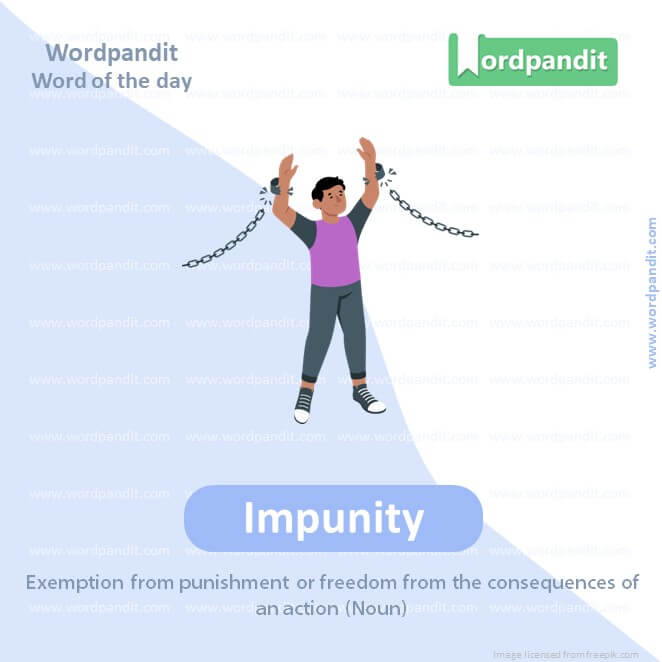
WORD-10 Impunity
CONTEXT The rampant radicalisation provides an opportunity for the muzzled civic voices in Manipur, and in the valley in particular, to raise their concerns about the impunity enjoyed by such forces.
SOURCE: The Hindu
Explanatory Paragraph: Imagine if someone broke a rule, like drawing on the walls, but didn’t get in trouble at all. They could keep doing it without worrying about being punished. Impunity is when someone does something wrong but doesn’t have to face any consequences, so they’re not afraid of getting in trouble.
Meaning: Exemption from punishment or freedom from the consequences of an action (Noun)
Pronunciation: im-PYOO-nih-tee
Synonyms: Exemption, Immunity, Freedom, License, Exoneration
Usage Examples:
1.The criminal acted with impunity, believing he would not be caught.
2.Fighting corruption requires addressing the issue of impunity.
3.The regime’s leaders were often criticized for their impunity.
4.The policy was criticized for granting impunity to corporate wrongdoers.
Vocabulary Hard Words
The experience of unraveling the depths of language learning often leads us to ‘vocabulary hard words’. These challenging jargons might seem daunting initially, but with the right learning strategies, the enigma of ‘vocabulary hard words’ can turn into an enticing quest. But how can these ‘vocabulary hard words’ be learned effectively?
Firstly, to master ‘vocabulary hard words’, it’s vital to break down the process into manageable steps. Instead of tackling several words at once, focus on understanding a few each day. This gradual approach ensures effective retention and understanding.
Multimedia resources tremendously aid in comprehending ‘vocabulary hard words’. Movies, podcasts, or even music in the target language contribute a comprehensive perspective. They provide real-life contexts and usages of ‘vocabulary hard words’, making them more understandable and less intimidating.
The incorporation of memory-enhancing techniques, such as flashcards or digital apps, can significantly bolster the retention of ‘vocabulary hard words’. Such tools encourage active recall, helping to cement these words into your long-term memory. Mnemonic devices can also aid in making these words more approachable by associating the hard words with relatable images or stories.
Practice is decisive when learning ‘vocabulary hard words’. Using these words in your conversations, written communications, or even social media posts will facilitate a robust understanding and recall.
Finally, do not worry about making mistakes while using ‘vocabulary hard words’. Mistakes are essential stepping stones in the learning process. They provide insights into areas that need more focus and help refine your grasp over these words.
In conclusion, grasping ‘vocabulary hard words’ is undoubtedly a challenging task but not an insurmountable one. With the aid of effective strategies including graded learning, multimedia resources, memory-enhancing tools, and regular practice, the process of mastering ‘vocabulary hard words’ can become an engaging and rewarding journey.






